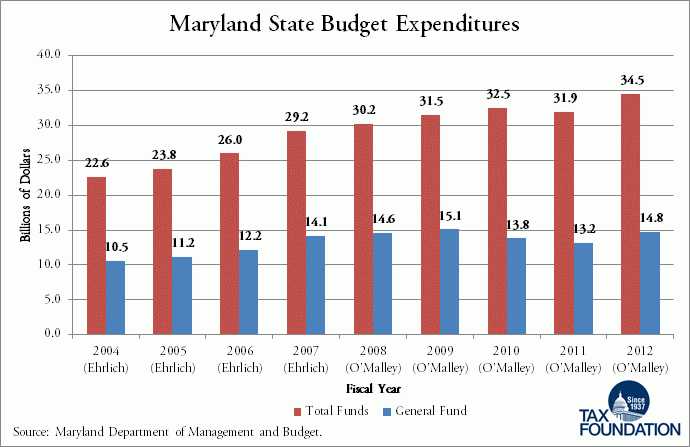Maryland Governor Martin O’Malley (D) hinted over the weekend that he would be seeking new taxes to balance the state’s budget:
“Any further help from Washington, I think you would agree . . . that’s pretty doubtful,” O’Malley said. “In fact, more likely is a lot more serious hurt. . . . We will have to make more cuts, and at the same time, to protect our children’s future, we must be open to new revenues.”
O’Malley said that his administration had cut billions of dollars of cumulative spending cuts since he took office in 2007, although for the most part those were not year-over-year cuts but reductions in growth (see chart below). Since 2004, Maryland’s budget has grown about 50 percent; in that time, inflation has grown a total of about 20 percent and state population growth has been a total of about 4 percent. The general fund alone has grown about 40 percent. Whatever anecdotal evidence there may be about draconian cuts, the numbers don’t really reflect that.
When O’Malley came into office in 2007, he attacked the recent budgetary spending spree. Rather than scale it back, however, he pushed through a taxA tax is a mandatory payment or charge collected by local, state, and national governments from individuals or businesses to cover the costs of general government services, goods, and activities. increase package (four new top income tax bracketsA tax bracket is the range of incomes taxed at given rates, which typically differ depending on filing status. In a progressive individual or corporate income tax system, rates rise as income increases. There are seven federal individual income tax brackets; the federal corporate income tax system is flat. on high-income earners and an increase in sales taxA sales tax is levied on retail sales of goods and services and, ideally, should apply to all final consumption with few exemptions. Many governments exempt goods like groceries; base broadening, such as including groceries, could keep rates lower. A sales tax should exempt business-to-business transactions which, when taxed, cause tax pyramiding. from 5% to 6%). The very top tax bracket expired at the end of last year. Spending since 2007 has risen modestly since that year, although O’Malley’s proposed 2012 budget is an 8 percent increase over 2011.
Share this article